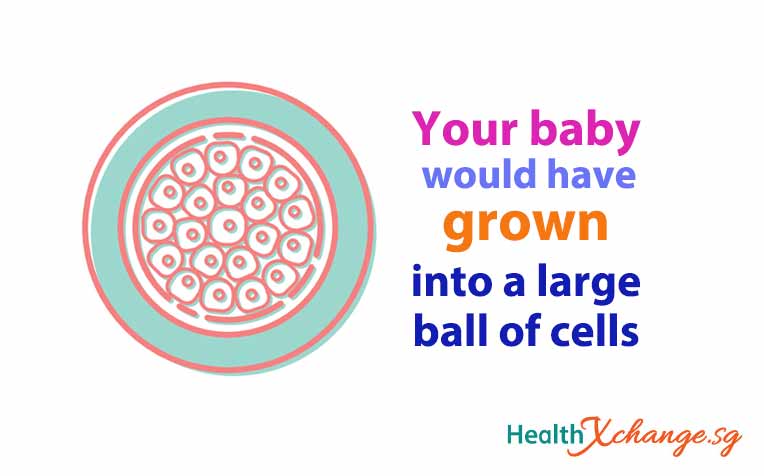
Pregnancy week 4 marks the time when your baby would have grown into a large ball of about a hundred cells, known as a blastocyst.
For mom
By pregnancy week 4, your baby would have grown into a large ball of about a hundred cells. At this stage, this large ball of cells is known as a blastocyst. By the later half of pregnancy week 4 (about 12 days post fertilization), the blastocyst would have successfully implanted itself into your womb!
Before your body recognises the pregnancy, the blastocyst has to complete a series of steps:
- The blastocyst has to hatch from the outer covering of the original egg.
- After hatching, the blastocyst floats around the uterus for several days, searching for a suitable and welcoming location to burrow itself into the uterus. Usually, the chosen location is at the roof of the uterus (womb).
As it burrows into the uterus, the blastocyst changes once again and becomes an aggressive invader. Part of the invading body starts to secrete a hormone called Human Chorionic Gonadotrophin (HCG).
This is one of the earliest maternal-embryo reactions leading to the maternal recognition of pregnancy. In a normal pregnancy, HCG levels double every second day (36-48 hours). Initially they might be too low to detect in the urine with an over-the-counter pregnancy test kit. Therefore, one might have to wait roughly a week after intercourse to obtain a positive result. The rising HCG levels are responsible for some of the symptoms that you may experience later in pregnancy.
For baby
By the later half of this week (about 12 days post fertilisation) the blastocyst would have successfully implanted itself into your womb.
Once implanted, the ball of cells gradually differentiates into 2 parts:
- The first group of cells will eventually form the placenta while the
- Other part becomes the developing embryo
On a side note, signals in the form of the hormone progesterone are being transmitted to your brain to tell it you are pregnant and to temporarily stop those monthly periods. Thus, preventing your uterine lining from being shed.
Also, the blastocyst secretes substances that tweaks your immune system and prevents your body from "seeing it" as a foreigner. Therefore, preventing itself from being attacked.
The above processes are so important, and failure for them to successfully occur can result in a miscarriage.
Ref: L20
Click the link for the complete listing of articles for Pregnancy Week 1 - Week 40.
Contributed by

















